Part 2: Making the Leap to an Ultramarathon: Advice from Top Ultramarathon Bloggers
Are you considering running an ultramarathon? We’ve interviewed several of the top ultra distance running bloggers to collect real and applicable advice to help you accomplish your first ultra. No matter which distance you’re making the leap from, these experts have shared gems of knowledge that can help you cross the ultra finish line.
In the first part of the series, the bloggers discussed what they felt was the most challenging aspect of your first ultramarathon. In this section, we asked them to unmask the misconceptions that are commonly believed about ultrarunning.
Ultrarunning Myths Debunked By The Experts
THE RUNNERS
 “I think one of the most common misconceptions about ultrarunning is that it's only for the superhuman types. Sure, you have to have mental strength and you have to train, but it isn’t an impossible feat. At the end of the day, running for a long distance on trails is a pretty basic activity. You put one foot in front of the other, stay tuned in to your effort, make sure to eat and drink, and most likely, you’ll be just fine.”
“I think one of the most common misconceptions about ultrarunning is that it's only for the superhuman types. Sure, you have to have mental strength and you have to train, but it isn’t an impossible feat. At the end of the day, running for a long distance on trails is a pretty basic activity. You put one foot in front of the other, stay tuned in to your effort, make sure to eat and drink, and most likely, you’ll be just fine.”
TRAINING MYTHS
 “New ultrarunners and people considering the sport often assume that adequate preparation requires an incredible volume of running in time and mileage. "I can't do it because I'm too busy," they tell themselves. That's not true. You CAN do it, and you might be surprised that you don't need to go for 40-mile long runs in order to be an ultrarunner.
“New ultrarunners and people considering the sport often assume that adequate preparation requires an incredible volume of running in time and mileage. "I can't do it because I'm too busy," they tell themselves. That's not true. You CAN do it, and you might be surprised that you don't need to go for 40-mile long runs in order to be an ultrarunner.
RACE DAY EXPECTATIONS
 “Everyone thinks that runners “run” the entire way and this couldn’t be more far from the truth. In fact, Id say that 99% of the field walks in almost every ultra out there at some point. Yes, even the elites walk!
“Everyone thinks that runners “run” the entire way and this couldn’t be more far from the truth. In fact, Id say that 99% of the field walks in almost every ultra out there at some point. Yes, even the elites walk!
IN ESSENCE THE ULTRA BLOGGERS
RACE DAY EXPECTATIONS
IN ESSENCE THE ULTRA BLOGGERS
There’s quite a bit of stigma surrounding the realm of ultrarunning. How much of it is true? We asked these top ultra bloggers to put to rest the most common myths about ultrarunning. The misconceptions these experts encounter typically have to deal with their presumed mental instability, the extensive and time consuming training required, and misleading details about the actual race. If you've been concerned about any of these aspects, read on. We're sure you'll find a bit of relief hearing what the pros have to say concerning these silly misconceptions about ultrarunning.
Believe it or not, ultrarunners are not always what you expect them to be. In fact, a vast majority of misconceptions surrounding ultrarunning involves the type of people that decide to take on the ultra distances. When it comes down to it, ultrarunners are just like you and me. They are normal, well-adjusted members of society who’ve happened to find something they love.
“One of the most common misconceptions about ultrarunning is that it is an outlandish sport that irrational people do to satisfy some absurd obsession. This couldn’t be further from the truth. I’ve gotten to know a lot of ultrarunners over the years. What I’ve learned about them is similar to what I’ve learned about myself. As I’ve said before, we are just normal people. We are the electrician who crawls into your attic when you need wiring in your home. We are the parent who drives their child to water polo practice every day. We are men and women who report to an office every day. More than anything, though, we are people who want something more in life. Something real, not just material. Something we have to dig deep within ourselves to obtain, and the deeper we dig, the more satisfied we are.”
Ultrarunning is not a sport just for the “crazy”, “old”, or “superhumans”. In fact, it’s a way for runners to enjoy the world around them and to find peace and satisfaction that can be hard to find in our busy, stressful lives.
There are countless myths surrounding the training that’s needed for an ultra. Everyone has their own idea of what training should look like, but in reality, the expectations aren’t very accurate. Everything from the time required and the mileage run each week to be able to conquer an ultra distance race can be different than what is assumed.
 “When road marathoners start considering a trail ultramarathon, they often think that ultra training looks a lot different than what they did for the marathon, and that it will take up a lot more time. In reality, they’re very similar.
“When road marathoners start considering a trail ultramarathon, they often think that ultra training looks a lot different than what they did for the marathon, and that it will take up a lot more time. In reality, they’re very similar.
There are countless myths surrounding the training that’s needed for an ultra. Everyone has their own idea of what training should look like, but in reality, the expectations aren’t very accurate. Everything from the time required and the mileage run each week to be able to conquer an ultra distance race can be different than what is assumed.
Sure, you’ll want to increase time spent on the trail, and replace some of the speed work with extra mileage, but I’m a firm believer that if you can run a marathon, you have the strength and skills to run a 50K ultramarathon.
And you can do it while having a job, taking care of kids, and juggling everything else life throws your way.”
I train for 100-milers with 65-75 miles per week of running, and I always take one day fully off. Granted, these are hard miles at altitude with plenty of quality, but I'm not spending my entire life running and I still have time for work and family. Many of my clients have experienced success in long ultras on less training than that. Key to your preparation is intentional, structured training, and you might consider reading books and articles and/or working with a coach. Also, keep in mind that what's right in training for your running buddy might not be right for you, so don't shy away from doing your own thing when needed.”
As a coach, I make it clear to my clients that it doesn't take 100+ mile weeks, long runs of 30, 40, 50+ miles, or regular "back to back" weekend long runs to be ready to run an ultra. That goes for 100+ mile races too! Many of my clients have been fit and ready to complete (and complete it well) their first ultra from 50k up to 100 miles on just 30-35 miles per week with long runs that rarely crack 18-20 miles. Much less than most road marathoners. That's not to say that ultrarunners are lazy! If you factor in the time on feet and vertical gain into the training notes then it's easy to see why "less MILES" is actually OK. As in any sport, specifically those with high impact like running, rest if especially important to benefit from the training. Don't get caught up in the number of miles you run. Rather think about the type of miles you'll be running during your goal race(s). Tailor your training to mimic that. Chances are your total miles will decrease, but your fun while training and time on your feet will likely increase!”
These ultra bloggers make it very clear that you have the time needed to prepare for your first ultramarathon. You can train to run a 50k race even with juggling family, work, and daily responsibilities. Also, training doesn’t focus too much on the number of miles; the amount of miles ran, per run or per week, does not determine success in finishing an ultra. Be sure to keep these bloggers’ helpful tips in mind for when you begin your ultra training!
Race day will never be exactly what you expect or plan for - that’s just a given fact. However, that doesn’t stop runners from making assumptions about various aspects of the race. A commonly held misconception, in specific, involves how runners tackle the race.
So, that said, if people train the walk/run and become very efficient at power walking (or as I call it, power walking with purpose) chances are good that they have the capability to complete an ultra! All of my athletes who are training for an ultra spend a great deal of time learning how to be efficient at power walking. This includes training the hip flexors in that range, how to intake calories while walking fast, and how to really move uphills with power and speed, all while walking. The longer the race, the more power walking that happens. In fact, in many cases, it is much easier and faster to walk then it is to run. I challenge many of my athletes to test this theory. I ask them to power walk up a hill beside someone who is running and to notice if they are maintaining the same pace, while determining who is expending more energy. In addition, it is important for ultrarunners to become good at transitioning back and forth between run/walking and to not get lulled into just walking when they could in fact be running.
There is definitely a strategy to finishing an ultra distance race efficiently. As part of that strategy, running 100% of the time isn’t required, expected, or even smart. Remember that you need to do what works best for your body and physical capabilities based on the mileage and terrain involved. Don’t be afraid to use the walk/run method, as it is very commonly used across the sport of ultrarunning!
These ultra bloggers have seen and heard all kinds of rumors and myths about the sport of ultrarunning. They’ve shared their thoughts to shed light on the inconsistencies and realities that they experience. Among the top myths to debunk, here is what you ought to remember: ultrarunners themselves are just normal people, the training isn’t as time-consuming or mileage-intense as you’d think, and walking during parts of the race is an effective strategy to be utilized. By knowing these simple truths, you are already more prepared to take on an ultramarathon than before.
Stick around for the final part of this interview series, as the ultra bloggers share insight into what you should know before running your first ultramarathon!
NordicTrack is grateful for the bloggers that participated and shared their knowledge on this topic! If you’d like to follow them and read more about their adventures and experiences as ultrarunners, visit their websites!
Katie Bassett - http://sunkissedredhead.blogspot.com/
Will Cooper - http://www.willrunlonger.com/
Doug Hay - http://www.rockcreekrunner.com/
Jamie King - https://fitapproach.com/ | http://jamiekingfit.com/
Travis Macy - http://www.travismacy.com/
Thomas Reiss - http://thomasreiss.com/
Jen Segger - http://jensegger.com/


Comments
Post a Comment